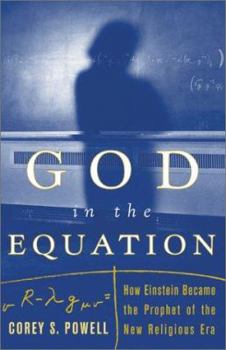God in the Equation: How Einstein Became the Prophet of the New Religious Era
Religion and science meet in a new big bang of a book. Corey Powell's riveting story explores how scientists try to explain more than the material universe. The initial idea was Einstein's 'fudge... This description may be from another edition of this product.
Format:Hardcover
Language:English
ISBN:0684863480
ISBN13:9780684863481
Release Date:August 2002
Publisher:Free Press
Length:288 Pages
Weight:0.95 lbs.
Dimensions:1.0" x 5.8" x 8.7"
Customer Reviews
4 ratings
Accessible, Informative and thoughtful
Published by Thriftbooks.com User , 14 years ago
Enjoyed this book a lot. It is well written and thoughtful. Not only worth the read, it presents a lot of thoughts worth mulling over.
Wow! A real mind-opener.
Published by Thriftbooks.com User , 20 years ago
I can't recall ever reading another book quitelike this one. Most of the books about science andreligion I've seen fall into one of two categories.They either try to make the case that scientists aresecretly religious people, or else they try to arguethat science leaves no room for faith. Powell takesthe discussion in a very different, more subtledirection, one that reminds me of some of DanielDennett's ideas. In essence, Powell argues thatspirituality is an integral component of the wayhumans process information about the world--even ifthe people doing the processing are cosmologists whoopenly describe themselves as atheists. Thatperspective puts a whole new spin on Albert Einstein's often-puzzling use of the word "God" as something interchangeable with the laws of physics. It also explains why, in his later years, Einstein was so committed to the idea of a cosmic religion. Alas, Einstein was an idealist and I'm afraid Powellmay be too. His dream that science can reform religionof its more destructive impulses looks just likethat--a dream. Religion seems to be doing just fine inthe Middle East, not to mention in Mel Gibson's bankaccount. But Powell's analysis of how the scientificprocess works is both original and eye-opening. I alsoreally enjoyed his sweeping history of cosmology, fullof clear explanations and surprising details. Thesection on the early history of the big bang, inparticular, covers territory that I've never headabout before. (The father of the big bang was anobscure Russian meteorologist--who knew?) This bookdoes an amazing job explaining what we know about theuniverse and how we know it. If it also helps advance Einstein's pacifist agenda, so much the better. Truly inspirational.
a provocative mix of science and philosophy
Published by Thriftbooks.com User , 21 years ago
It's hard to get much bigger than the themes in thisbook: how did the universe begin, how will it end, andis there any way to find spiritual satisfactionthrough science? Amazingly, this writer pulls it off.The first part of the book covers historical ideasabout the universe, bringing people like Galileo andNewton to life as complex, passionate thinkers. Thelater chapters get into modern cosmology, covering thebig bang and some of the current far-out ideas about"dark energy" and other universes.
Hawking's Too Hard; This is Comprehensible Cosmology
Published by Thriftbooks.com User , 21 years ago
Those of us laymen who would like to be conversant with the latest issues in science are too frequently faced with a choice between over-simplifications or complex books that lie reproachingly in our bookshelves. Someday we'll finish them, we promise ourselves. Even better, we hope that someday we'll actually understand what we read. This book is not too long to tackle, and addresses complex ideas in clear language that makes the concepts capable of understanding. And one feels that, should something become fuzzy in one's mind as time passes, it wouldn't be hard to go back to the index and refresh one's understanding without having to plough through a dense forest of forgotten concepts. God really is only in the equation in this book; God in the commandment isn't considered. But cosmology really is the book's focus and strength. Isaac Asimov wasn't so hot on religious concepts either. But how he is missed for making science comprehensible. That's Corey Powell's strong point too. Maybe he should tackle more science topics and fill in a part of the void that Asimov left.





